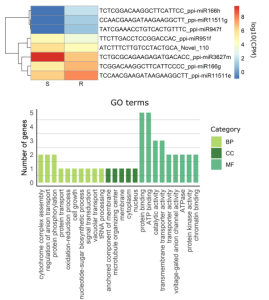
Modesto I, Inácio V, Van de Peer Y, Miguel CM.
Pine wilt disease (PWD), caused by the parasitic nematode Bursaphelenchus xylophilus, or pinewood nematode (PWN), is a serious threat to pine forests in Europe. Pinus pinaster is highly susceptible to the disease and it is currently the most affected European pine species. In this work, we investigated the role of small RNAs (sRNAs) in regulating P. pinaster–PWN interaction in an early stage of infection. After performing an artificial PWN inoculation assay, we have identified 105 plant microRNAs (miRNAs) responsive to PWN. Based on their predicted targets, part of these miRNAs was associated with roles in jasmonate-response pathway, ROS detoxification, and terpenoid biosynthesis. Furthermore, by comparing resistant and susceptible plants, eight miRNAs with putative functions in plant defence and resistance to PWN have been identified. Finally, we explored the possibility of bidirectional trans-kingdom RNA silencing, identifying several P. pinaster genes putatively targeted by PWN miRNAs, which was supported by degradome analysis. Targets for P. pinaster miRNAs were also predicted in PWN, suggesting a role for trans-kingdom miRNA transfer and gene silencing both in PWN parasitism as in P. pinaster resistance to PWD. Our results provide new insights into previously unexplored roles of sRNA post-transcriptional regulation in P. pinaster response and resistance to PWN.



